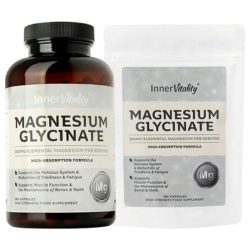What Is the 3 Best Magnesium Supplement to Take: Unveiling the Secrets to Optimal Health.
Introduction
Welcome to our comprehensive guide on selecting the right magnesium supplement tailored to your specific health requirements. In the pursuit of a healthier lifestyle, choosing the right supplement is crucial. Magnesium plays a pivotal role in various bodily functions, making it essential for overall well-being. In this article, we will explore the top 3 magnesium supplement that stand out in the market, providing you with the knowledge you need to make an informed decision for your health.
What Is the 3 Best Magnesium Supplement to Take: A Detailed Overview
Understanding the Importance of Magnesium
Magnesium, often dubbed as the “miracle mineral,” is involved in more than 300 biochemical reactions in the body. From supporting muscle and nerve function to regulating blood sugar levels, magnesium is indispensable for maintaining optimal health.
The Power Trio: Top 3 Magnesium Supplements
- 3 magnesium supplement – Magnesium Citrate: Magnesium citrate is renowned for its high bioavailability, making it easily absorbed by the body. It aids in muscle relaxation, alleviating cramps and spasms. Additionally, it promotes better sleep quality, making it an ideal choice for those struggling with insomnia.

<< Click to Check it on Amazon >> - 3 magnesium supplement – Magnesium Glycinate: If you’re looking for a magnesium supplement with minimal laxative effects, magnesium glycinate is an excellent option. It is gentle on the stomach, making it suitable for individuals with sensitive digestive systems. Magnesium glycinate is often recommended for easing anxiety and stress, promoting mental relaxation.

<< Click to Check it on Amazon >> 3. 3 magnesium supplement – Magnesium L-Threonate: Magnesium L-threonate is prized for its unique ability to cross the blood-brain barrier, enhancing cognitive function and memory. It is particularly beneficial for individuals looking to boost brain health and mitigate the effects of ageing on cognitive abilities.

<< Click to Check it on Amazon >>
FAQs About Magnesium Supplements
Q: Can I take magnesium supplement daily? A: Yes, magnesium supplements are generally safe for daily consumption. However, it’s advisable to consult a healthcare professional to determine the appropriate dosage for your specific needs.
Q: Are there any side effects associated with magnesium supplements? A: While magnesium supplements are generally well-tolerated, excessive intake can cause diarrhea and stomach cramps. It’s essential to follow the recommended dosage to avoid adverse effects.
Q: Can magnesium supplements interact with other medications? A: Yes, magnesium supplements can interact with certain medications, including antibiotics and diuretics. It’s crucial to inform your healthcare provider about all supplements and medications you’re taking to prevent potential interactions.
Q: How long does it take to experience the benefits of magnesium supplements? A: The timeline for experiencing the benefits of magnesium supplements varies from person to person. Some individuals may notice improvements in sleep quality and muscle relaxation within a few days, while others may take a few weeks to experience noticeable changes.
Q: Are there natural food sources of magnesium? A: Yes, magnesium is naturally found in various foods such as leafy green vegetables, nuts, seeds, and whole grains. Including magnesium-rich foods in your diet can complement magnesium supplementation.
Q: Can magnesium supplements help with migraines? A: Some studies suggest that magnesium supplementation may help reduce the frequency and intensity of migraines. However, individual responses vary, and it’s essential to consult a healthcare professional for personalized advice.
Conclusion 1
In conclusion, choosing the right magnesium supplement is a vital step toward enhancing your overall well-being. By understanding the unique benefits of magnesium citrate, magnesium glycinate, and magnesium L-threonate, you can make an informed decision tailored to your health needs. Remember, consulting a healthcare professional is always recommended to determine the most suitable supplement and dosage for your individual requirements.
What Is the 3 Best Magnesium Supplement to Take: Finding the Right Dosage
SEO Meta Description: Discover the recommended doses for Magnesium Citrate, Magnesium Glycinate, and Magnesium L-Threonate. Learn about the optimal dosage to harness the benefits of each magnesium supplement for your health.
Introduction
Determining the correct dosage of magnesium supplement is crucial for maximizing their benefits and avoiding potential side effects. In this section, we will explore the recommended doses for Magnesium Citrate, Magnesium Glycinate, and Magnesium L-Threonate, ensuring you have the essential information to make an informed decision about your health.
Magnesium Citrate: Recommended Dosage
The recommended dosage of Magnesium Citrate varies based on age, gender, and individual health needs. However, a general guideline for adults is 200-400 mg per day. It’s advisable to start with a lower dose and gradually increase it under the supervision of a healthcare professional. Taking Magnesium Citrate with food can enhance its absorption and minimize the risk of digestive discomfort.
Magnesium Glycinate: Recommended Dosage
For Magnesium Glycinate, the typical dosage ranges from 200-400 mg per day for adults. This form of magnesium is gentle on the stomach, allowing for easier absorption. It’s often recommended to split the dosage throughout the day to maintain consistent magnesium levels in the body. As always, consulting a healthcare provider is essential to determine the appropriate dose based on individual health factors.
Magnesium L-Threonate: Recommended Dosage
Magnesium L-Threonate, known for its cognitive benefits, is usually taken in doses of 144 mg of elemental magnesium, which is equivalent to approximately 2,000 mg of Magnesium L-Threonate. This form of magnesium is specifically designed to support brain health. Due to its unique properties, it’s crucial to follow the recommended dosage and avoid exceeding it without medical supervision.
Consultation with a Healthcare Professional
It’s important to emphasize that individual magnesium needs can vary significantly. Factors such as age, existing health conditions, and medications can influence the appropriate dosage. Therefore, it is highly recommended to consult a healthcare professional before starting any magnesium supplementation regimen. A qualified healthcare provider can assess your specific needs and tailor the dosage to ensure optimal health benefits while minimizing the risk of adverse effects.
Conclusion 2
Finding the right magnesium supplement and dosage is a personalized journey., that why we have selected for you the 3 best magnesium supplement to make it easier for you. By understanding the recommended doses for Magnesium Citrate, Magnesium Glycinate, and Magnesium L-Threonate, you are better equipped to make an informed decision about your health. Remember, the key to harnessing the benefits of magnesium supplements lies in responsible supplementation under the guidance of a healthcare professional.
What Is the 3 Best Magnesium Supplement to Take: Unveiling the Pros and Cons
SEO Meta Description: Explore the pros and cons of Magnesium Citrate, Magnesium Glycinate, and Magnesium L-Threonate to make an informed choice for your health. Learn about the unique benefits and potential drawbacks of each magnesium supplement.
Introduction
When it comes to choosing the right magnesium supplement, the options can be overwhelming. So we have selected
3 Best Magnesium Supplement
Magnesium Citrate, Magnesium Glycinate, and Magnesium L-Threonate are three popular choices, each with its unique set of benefits and considerations. In this section, we will delve into the pros and cons of each supplement, empowering you to make a well-informed decision tailored to your health needs.
Magnesium Citrate: Pros and Cons
Pros:
- High Absorption Rate: Magnesium Citrate is known for its excellent absorption rate, making it effective in addressing magnesium deficiency quickly.
- Muscle Relaxation: It helps in relieving muscle cramps and spasms, making it beneficial for athletes and individuals with muscle-related issues.
- Better Sleep: Magnesium Citrate aids in relaxation, promoting better sleep quality and aiding individuals struggling with insomnia.
Cons:
- Digestive Issues: In some cases, Magnesium Citrate can cause digestive discomfort, including diarrhea and stomach cramps, especially when taken in excessive amounts.
- Laxative Effect: Its laxative effect, while helpful for some, can be a drawback for individuals with sensitive stomachs.
Magnesium Glycinate: Pros and Cons
Pros:
- Gentle on the Stomach: Magnesium Glycinate is gentle on the stomach, making it suitable for individuals with sensitive digestive systems.
- Minimal Laxative Effect: Unlike Magnesium Citrate, it has minimal laxative effects, ensuring a comfortable experience for most users.
- Anxiety Relief: It is often used to ease anxiety and stress due to its calming effects on the nervous system.
Cons:
- Lower Absorption Rate: Compared to Magnesium Citrate, Magnesium Glycinate has a slightly lower absorption rate, which might require higher doses for the same effect.
- Cost: It can be more expensive than other magnesium supplements, which might be a drawback for budget-conscious individuals.
Magnesium L-Threonate: Pros and Cons
Pros:
- Brain Health: Magnesium L-Threonate is unique for its ability to cross the blood-brain barrier, supporting cognitive function and memory.
- Neuroprotective Properties: It exhibits neuroprotective properties, making it potentially beneficial for individuals concerned about brain aging and neurodegenerative diseases.
- Enhanced Learning: Some studies suggest that it may enhance learning abilities and promote synaptic plasticity in the brain.
Cons:
- Limited Research: While promising, there is still limited research on its long-term effects and interactions with other medications, necessitating caution.
- Availability: It might be less readily available in local stores compared to more common magnesium supplements.
Conclusion 3
In your quest for the 3 best magnesium supplement, it’s essential to weigh the pros and cons of each option. Magnesium Citrate offers high absorption and muscle relaxation but might cause digestive issues. Magnesium Glycinate is gentle on the stomach and aids anxiety relief but may have a lower absorption rate and be pricier. Magnesium L-Threonate supports brain health and learning but lacks extensive research and might be less accessible.
Ultimately, the best choice depends on your specific health needs, tolerance, and budget. Always consult with a healthcare professional to determine the most suitable magnesium supplement tailored to your individual requirements.




